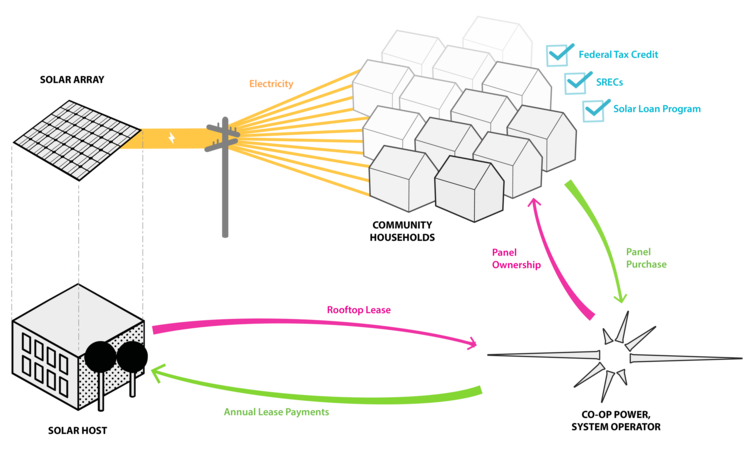Author: Kiam Jamrog-MQuaid
Short Summary
Co-op Power is a network of community energy cooperatives (CECs) incorporated in Massachusetts as a consumer-owned energy cooperative. These local CECs and their members work to deliver energy efficiency and renewable energy resources to the communities they live in. Through the cooperative model—crowdfunding through its members and leveraging collective bargaining—co-op power members are able to finance community-scale energy projects and businesses that are owned by and benefit the community members.Website address: https://www.cooppower.coop
Location: Cooperatively owned by families across Massachusetts, Vermont, Connecticut, New Hampshire, and New York, USA
Identify key individuals/coordinators/leaders if they are named

Logo source ![]()
Profile
Co-op Power was founded on the idea that local stewardship and control of resources are critical to protect our environmental and economic future. By keeping ownership local, Co-op Power is working to keep jobs, capital, and energy in the hands of the community. They are a self-proclaimed “grassroots vehicle to counter political and social trends that compromise the environment and economy (source)."By becoming a member of Co-op Power, you are investing in this local mission of community ownership of energy infrastructure. Co-op membership is open to all people in the community and entitles each member to a number of benefits, including discounts on energy consultations; home heating and cooling equipment; rebates on solar installation; and more. Members are also eligible to participate in the fuel oil buying group program, which leverages the group buying power to negotiate a discount on home heating oil. There is a one-time (or through installments) membership share buy-in to join, or tiered membership options that offer fewer benefits.
Because of its decentralized structure, the individual CECs democratically decide on which community-scale projects are created and supported. Examples of these projects include community-scale solar installations as well as small renewable energy and energy efficiency businesses such as Northeast Biodiesel, five solar installation businesses, two green electricians, and one thermal window insert business.

"Diagram of the community owned solar model." source ![]()
Governance
The Co-op Power Board comprises the representatives from each Community Energy Co-Op (CEC), along with several at-large board members that are elected by all individual members. Each CEC serves as a regional sub-committee. In this way, Co-op Power aims to practice Sociocracy as a governance model.In 2009, the Co-op adopted its regional structure of local Community Energy Co-ops (CECs). Any 20 members of Co-op Power who are willing to commit to the mission and the responsibilities of running a CEC are able to form one. This allows each region to self-organize and set its own energy priorities. Each CEC is led by a steering committee and is entitled to a representative on the Co-op Power Board of Directors. When applying to join Co-op Power as a member CEC, the 20 members must sign a Letter of Interest, nominate a board member, and await the decision from the full Co-op Power board. Some of the responsibilities taken on by these local CESs include outreach and membership development; education on co-ops and community-owned energy; community planning; and public policy advocacy.
CECs can also apply for member equity funds through the board to finance local energy projects: “75% of the memberships raised by your CEC will be held in trust to invest in your projects (2/3rd of that is equity to invest and 1/3rd is income you can spend). 25% of the memberships you raise will be allocated to support regional Co-op Power Member Development and Governance” (source).
Projects
Some notable projects supported by Co-op Power include:- Northeast Biodiesel, LLC.: A cooperative business that shares ownership among its employees and Co-op Power. According to their website, they are set up to produce 1.75 million gallons of biodiesel from recycled vegetable oil. They have plans to increase this capacity to 3.5 million gallons in the coming years.
- River Valley Co-op partnership: Through a partnership with River Valley Co-op, Co-op Power is bringing community solar generation (and energy discounts) to low-income families while helping to offset energy usage for the community-owned grocery store. Completed in 2022, the 178-kilowatt solar array generates enough power to completely offset the energy usage from the store while providing 50% of the energy generated to low-income families at reduced cost using the Co-op Power community solar model.
Friends & Partners
- What types of people and organizations does it work with?
- Any formal institutional partners or network of allies
Finances
As a consumer-owned cooperative, Co-op Power operates as a business. This means that in addition to providing member benefits and community education, the organization provides services to the community. Co-op Power previously partnered with MassSave, a state and utility-sponsored program aimed to help Massachusetts residents get discounts and rebates on home energy-efficiency improvements and retrofitting. The co-op received funding to assist in these retrofits (i.e. insulation upgrades, LED light systems, mini-split installations, etc.).After Co-op Power lost the MassSave contract in 2017, its business plan shifted to developing and managing community solar arrays. In this way, the co-op has morphed into a solar investment cooperative to finance community-scale projects led by local CECs. It is able to break even in these development projects through the use of tax credits and a Partnership Flip Model.
Origin Story
Co-op Power is the product of two decades of work by passionate community members working together towards a common goal of sustainability through the lens of social, environmental, and economic justice. By changing its structure and adapting to members’ needs over time, Co-op Power has been able to innovate while maintaining its long-held mission.See Also
- Other commons categories that are related to this one's, or specific similar examples
Sources
- Interview with Marianne Connor, the former Interim Manager of Co-op Power, conducted by Kiam Jamrog-McQuaid on October 7, 2022
- Daily Hampshire Gazette, “Partnership at River Valley Co-op helping low-income households with energy savings”